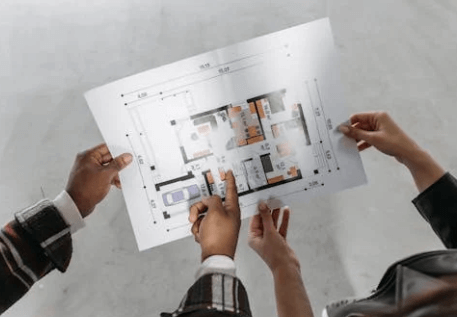Starting the process of building your dream home is an exciting and fulfilling experience, but understanding the cost to hire a contractor to build a house is crucial for budgeting. On average, contractor fees account for 10% to 20% of the total construction cost, with the overall price ranging from $150,000 to $450,000, depending on your location and home size. Steve Daria and Joleigh, renowned real estate investors and cash land buyers, are here to help simplify the process. Their expertise makes them an invaluable resource, providing personalized advice carefully tailored to meet your specific needs. Knowing the cost to hire a contractor to build a house can help you make sound choices and avoid surprises as you plan. Whether you’re starting from scratch or purchasing land for construction, the right guidance can save time and money. Book a free discussion with Steve and Joleigh today to discover your possibilities and take the first step toward making your dream home a reality!
Key Points
- Factors That Impact Contractor Costs: The cost to hire a contractor to build a house depends on several factors, including your home’s size, design, and materials. Contractors usually take 10% to 20% of the total construction budget, which can add a significant amount to the project cost.
- Regional Differences in Pricing: Location is key when building a house. Construction costs can differ significantly based on the region, with urban areas typically being pricier than rural ones due to higher labor and material expenses.
- Custom vs. Standard Homes: Building a custom-designed home will generally cost more than a standard, pre-designed build. Contractors may charge higher fees for custom designs because they often require more time and effort to complete.
- Hidden Costs to Watch For: There are often additional expenses like permits, inspections, or unforeseen changes during construction. A comprehensive estimate from your contractor can help you anticipate and budget for any additional expenses.
- The Value of Hiring Experienced Professionals: An experienced contractor might cost more upfront, but they can help avoid costly delays or mistakes. Hiring a reliable professional ensures a smoother process and better-quality results.
What factors affect the cost to hire a contractor to build a house?
Several factors influence the cost to hire a contractor to build a house, and understanding them can help you plan better.
Firstly, the size of your home plays a major role—larger homes naturally require more materials and labor.
The design complexity also matters, as intricate designs or custom layouts may take more time and effort, leading to higher charges.

Material choices are another factor; opting for premium or high-end materials will likely drive up costs.
Additionally, where your home is being built can affect pricing. Construction in urban areas often costs more due to higher labor and material expenses.
Contractor fees generally range from 10% to 20% of the total project budget, contributing significantly to the expense.
Hidden costs, such as permits, inspections, and unexpected changes, can also add to the overall price.
By discussing these factors with your contractor upfront, you can avoid surprises and stick to your budget.
Get Started: Get Your Cash Offer Below…
We are direct land buyers. There are no commissions or fees and no obligation whatsoever. Start below by sharing where your property is and where we can send your offer…
How can I estimate the total expenses for my new home?
Estimating the total expenses for your new home involves considering all the key elements that contribute to the overall cost.
Start by calculating the cost to hire a contractor to build a house, typically accounting for 10% to 20% of the overall construction budget.
Consider the size of your home, as larger properties demand more materials and labor, which can significantly increase costs.
The materials you choose, whether standard or premium, will significantly affect your budget.
Don’t forget to include land costs if you haven’t already purchased a plot and fees for permits and inspections required by local authorities.
Unexpected costs, like addressing site-specific issues such as poor soil conditions, should also be included in your budget.
Additionally, consider utility hookups or any custom features you’d like, such as energy-efficient systems or luxury touches.
Working closely with your contractor and getting a detailed cost breakdown can create a more accurate estimate and avoid surprise expenses.
How do prices vary for contractors in different locations?
- Urban Areas: Contractors in big cities often charge higher rates due to higher living costs, like rent and wages. Demand for skilled labor in urban areas can also drive up prices compared to rural locations.
- Rural Locations: Hiring a contractor in rural areas may cost less because of lower labor wages and material prices. However, limited contractor availability might lead to delays or fewer choices in services.
- High-Demand Regions: Areas experiencing a building boom, such as rapidly growing suburbs, may see rising contractor rates. Increased demand for construction services allows contractors to charge premium prices.
- Regions with Harsh Weather: Locations prone to extreme weather, like heavy snowfall or hurricanes, often have higher contractor fees. Specialized building techniques and materials may be required, adding to the overall cost.
- Cost of Living Differences: Contractor fees vary greatly between states or regions with different living costs. For example, hiring a contractor on the West Coast may be more expensive than in Midwestern states due to regional economic differences.

What should I look for when comparing contractor quotes?
When comparing contractor quotes, looking at more than the overall price is essential to ensure you’re getting the best value.
Start by reviewing the scope of work included in each quote to see if all necessary tasks are covered.
Some contractors might leave out certain items to make their bids appear cheaper, which could lead to unexpected costs later.
Pay attention to the quality of the specified materials, as cheaper options may not last as long or look as nice.
The timeline for completing the work is another critical factor to consider, especially if you’re on a tight schedule.
Additionally, check whether the quote includes essential costs like permits, labor, and cleanup services.
Make sure to also investigate the contractor’s reputation by reading reviews or asking for references, as reliability and professionalism are just as important as price.
Comparing these key details will help you better understand the cost to hire a contractor to build a house and choose the right professional for your project.
Are there hidden costs I need to ask my contractor about?
- Permits and Inspections: Some contractors might not include permits and inspection fees upfront in their quotes. These costs are necessary to meet local building regulations and can affect the overall cost of hiring a contractor to build a house.
- Site Preparation Costs: If your building site needs extra work, like clearing trees or leveling the ground, you could face additional charges. These preparations are often left out of the initial estimate but can increase the cost to hire a contractor to build a house.
- Material Adjustments: Upgrades or changes to materials during construction can add to your expenses. If the agreed materials unexpectedly become unavailable, you might have to pay more for alternatives.
- Utility Hookups: Connection fees for water, electricity, and gas lines are sometimes overlooked. Make sure these are included in your budget to avoid surprises that could raise the cost of hiring a contractor to build a house.
- Cleanup and Waste Removal: Some contractors charge extra for cleaning the site and hauling debris after construction. Clarifying this beforehand ensures you won’t be stuck with unexpected cleanup expenses.
- Change Orders: Any changes to the original plan after construction begins can result in extra fees. Even small adjustments, like moving a wall or adding a window, can impact your final budget.
- Unexpected Repairs: Undetected issues, like unstable soil or hidden water damage, can arise during construction. These repairs often aren’t included in the initial quote and can add to your total expenses.
How do I start working with a contractor after choosing one?
After selecting a contractor, the first priority is to formalize all agreements in a comprehensive written contract.
This should outline the scope of work, project timeline, payment schedules, and any materials to be used.
Clear communication is key, so set up a pre-construction meeting to discuss expectations and address any concerns.
Be sure to confirm a breakdown of costs to ensure there are no surprises later, especially when understanding the cost to hire a contractor to build a house.
Also, establish a system for updates, whether it’s through weekly check-ins or progress photos, to stay informed about how the project is moving along.
Before construction begins, double-check that all permits and approvals are in place, as these can cause delays if overlooked.
Once work starts, maintain a professional but cordial relationship with your contractor, offering prompt feedback if issues arise.
If you’re still wondering how to approach contractors or need advice, reach out to Steve Daria and Joleigh, expert real estate investors and seasoned land buyers for cash, who can offer invaluable guidance.
Don’t hesitate—start planning your home-building project with confidence!
**NOTICE: Please note that the content presented in this post is intended solely for informational and educational purposes. It should not be construed as legal or financial advice or relied upon as a replacement for consultation with a qualified attorney or CPA. For specific guidance on legal or financial matters, readers are encouraged to seek professional assistance from an attorney, CPA, or other appropriate professional regarding the subject matter.
